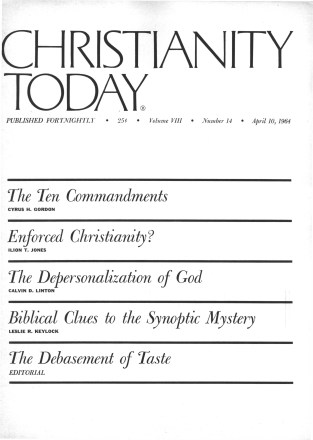When in 1949 Dr. Joseph Sizoo published his Preaching Unashamed he had behind him many years of experience in parish and pulpit ministry. He was by that time president of New Brunswick Seminary. The years, he tells us, had matured within him the “deep conviction” that a preacher must know at least these four things: (1) his times, (2) his Bible, (3) his Gospel, and (4) himself.
It is the first of these matters about which I want to speak.
To begin with, we must see Dr. Sizoo’s point in perspective. He assumes that our intelligence will tell us how impossible it is for the minister to know his times unless he knows his Bible. Even his knowledge of himself, as a person unable wholly to escape his age and therefore obliged to react to it, will be interlaced with his knowledge of the world in the midst of whose life his ministerial lot is cast.
Furthermore, we have no right to treat Dr. Sizoo’s observation with flippancy. There is insight as well as cleverness in the comment that “the Church which is married to the spirit of the age will find herself a widow in the next generation.” It is not, however, an identification with the manners and mores of the times for which one pleads; it is, rather, a perceptive awareness of the times and an identification with human need in terms of those forms it assumes that may indeed be peculiar to a certain age. The Zeitgeist is never the Church’s bridegroom; it is always the Church’s burden. It is not something to which the Church is to conform, but something that the Church, in the measure in which its redeeming Lord is relevantly proclaimed and honestly received, will transform.
It is relevance, however, that is crucial.
Let us take one facet of the matter and examine it. In his The Preacher-Prophet in Mass Society, Professor Jesse McNeil of California Baptist Seminary has a chapter entitled “Communicating with Mass Man.” Here he calls upon today’s preachers to take notice of the “many” who are freely saying that the Church is “irrelevant to the main and pressing concerns of our mass-produced contemporary life.” These people, whom the Church and its clergy leave cold, feel that “too long and too frequently has the Church emphasized man’s relation to the world to come and has offered little help in his struggle for a this-worldly mode and meaning of existence.”
A few days after reading Professor McNeil’s book I asked a friend about a young man of evangelical background who in late years has traveled widely, read considerably, and floundered pathetically. His reading and his personal associations have convinced him that the Church in the United States of America is ridiculously unimaginative, unprophetic, and unbiblical in its failure to lead its people boldly in the struggle for civil rights and for a Christian view of race. My friend told me that the young man asked a Christian dentist if any of his patients were Negroes. The dentist, an active churchman, told him that this would be quite impossible since he couldn’t use the same set of instruments on his white patients that he used on Negroes. The sheer irrationality of such thinking has turned him sourly against the Church. Preaching has no access to him because, when it did have his ear, it seemed to be unconcerned about any dimension of the Gospel that related it meaningfully and challengingly to one of the most disturbing human situations in which contemporary man finds himself.
This young man does not stand alone. Clichés will not satisfy him. Pious soporifics will not quiet him. Pseudo-scientific racist propaganda will not deceive him. Politically oriented evasions will only irritate him. He knows that politics has been defined as “the art of the possible,” but he also knows that the Gospel is supposed to have something to say about turning the impossible into the possible.
P. T. Forsythe once rebuked the liberalism of preaching that, as he put it, “seeks to be modern by the way of extenuation rather than realism, by palliation rather than penetration, by moral tenderness rather than by moral probing, by poetry rather than by prophecying, by nursing where surgery is required.”
By a devastatingly odd twist it is necessary at times to say that what passes for evangelical preaching is deserving of precisely the same indictment.
Making the Gospel respectable may hurt no lay feelings, threaten no ministerial salaries. Making the Gospel relevant may do both.










